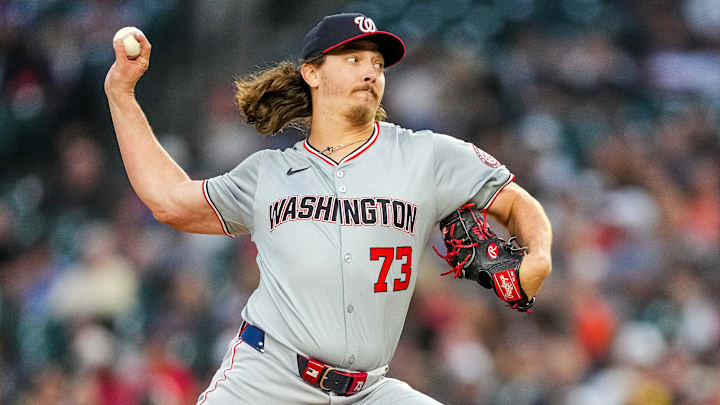Put to rest any thoughts that Cayden Wallace will soon be playing third base for the KC Royals.
He won't. The Royals saw to that Saturday when, after losing 5-0 to Boston, they announced Wallace, one of the club's hottest prospects, is no longer with the organization. Instead, Kansas City has traded him, and the Competitive Balance A pick they were scheduled to make Sunday between the first and second rounds of the MLB Draft, to Washington for relief pitcher Hunter Harvey.
What should immediately strike Royals fans is what it's costing the club to procure the services of a reliever who, in his third full big league season, is inarguably struggling. If the price isn't too high, it could be awfully close. It's definitely heavy.
Wallace, currently ranked by MLB Pipeline as the second-best prospect the Royals have — Pipeline considers only catcher Blake Mitchell to be better — is frequently touted as the next Kauffman Stadium third baseman. He was hitting .282 with a .350 OBP, three homers, and 16 RBI in 34 games at Double-A Northwest Arkansas until a late-May oblique injury forced him to the Injured List.
He began an injury rehab assignment in the Arizona Complex League during the last week of June and was 5-for-19 when he fractured a rib last weekend.
Highly-gifted, Wallace is slashing .265/.340/.420 with 18 homers and 118 RBI in the 198 games he's played since the Royals picked him in the second round of the 2022 draft.
Dealing away with their Competitive Balance pick reduces the Royals' number of draft selections to 20.
What are the KC Royals getting in this deal?
The easy answer to this question is, of course, Hunter Harvey which, at first blush, may not sound concerning. After all, Harvey has been pretty good for Washington: after 26 appearances across parts of 2019, 2020, and 2021, he had a 3.42 ERA and displayed acceptable control.
Then he blossomed. He posted a 2.52 ERA, 10.30 K/9, and 2.75 BB/9 over 38 appearances in 2022 and followed that effort up with a 2.82 ERA, 9.94 K/9, and 1.93 BB/9 in 57 games last season.
Unfortunately, it's been a different Hunter Harvey story this year; his struggles have been obvious. Although he's still striking out many and walking few, he's given up 24 runs (three of them unearned) in 45 innings for a 4.20 ERA representing a striking increase from those of his last two campaigns. Opponents knocked him around for eight earned runs in 10.1 innings last month, and have punished him for six earned runs in 5.1 frames this month. And he's 2-4 with a pair of blown saves.
Much to his credit, though, he's allowed only one of the 17 runners he's inherited in 43 appearances this year to score, and has a respectable 0.9 fWAR.
Why did the Royals make this trade?
Many will ask why general manager J.J. Picollo didn't just re-add Walter Pennington, who's 5-3, 2.33 in 33 games at Omaha and retired the only two batters he faced in his July 5 big league debut against Colorado, to the major league roster. He probably didn't want to wait until July 21, when Pennington will be eligible for recall after being optioned July 6 (his recall to serve as the 27th man in Tuesday's doubleheader against St. Louis was an exempt transaction).
And Picollo was likely looking for more experienced bullpen help than his farm system can provide. And the Royals are guaranteed this year and next with Harvey — he isn't eligible for free agency until after the 2025 season.
Time will tell whether Harvey can shake his struggles and help the Royals secure their first playoff berth since 2015.
To create spots for Harvey on the active and 40-man rosters, Kansas City designated Nick Anderson for assignment. Acquired in a November cash-for-player trade with Atlanta, he was 3-1 with a 4.04 ERA in 37 appearances for the Royals. He pitched a scoreless, two-strikeout inning against Boston Saturday afternoon before getting the bad news.
